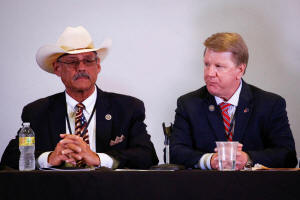2020 election conspiracists could soon oversee voting in U.S.
battleground states
 Send a link to a friend
Send a link to a friend
 [September 30, 2022]
By Andrew R.C. Marshall, Joseph Tanfani and Peter Eisler [September 30, 2022]
By Andrew R.C. Marshall, Joseph Tanfani and Peter Eisler
(Reuters) - Two far-right U.S. politicians
who want to upend the way votes are cast and counted are tied or leading
in races to become the top election administrators in their states,
according to recent polls.
Republicans Jim Marchant of Nevada and Mark Finchem of Arizona promote
wild conspiracy theories about how the 2020 election was stolen from
Donald Trump. A victory in November could allow them, as secretaries of
state, to restrict voting access or seek to block certification of
results in these two critical battlegrounds for presidential elections.
Marchant and Finchem want to curtail or abolish early voting, mail-in
voting and ballot drop-boxes, claiming without evidence that they breed
fraud. Both advocate banning electronic voting machines and returning to
hand-counted paper ballots to secure elections. Election experts and
officials of both major parties have said such changes would actually
make elections more prone to fraud and error, while making it harder for
citizens to vote.
Finchem and Marchant are among the strongest of 13 secretary-of-state
candidates who falsely claim the 2020 election was rigged. Two, in the
Republican strongholds of Wyoming and Alabama, are expected to win
easily. Four others are running competitive campaigns in Michigan,
Minnesota, Indiana and New Mexico. The remainder are long shots.

The movement to seize control of election administration is part of a
broader phenomenon that makes November’s midterm elections unique in
American history. Election deniers are campaigning in every state,
according to politics website FiveThirtyEight. Out of 552 Republican
nominees for Congress, governor, secretary of state and attorney
general, 262 — nearly half — have rejected or questioned the 2020
result.
The prospect of controlling state voting offices is bringing national
money into once-sleepy secretary-of-state races and drawing support from
some of Trump’s most prominent allies. Right-wing provocateur and former
Trump White House advisor Steve Bannon declared last week on his podcast
that Democrats “are not going to be winning anymore” because the likes
of Marchant and Finchem will be “in the counting room,” rooting out
ballots they deem illegal or illegitimate.
At a recent Florida conference featuring right-wing secretary-of-state
candidates, Marchant cast himself as an outsider and claimed that
“vicious” elements of his own party are scheming to help his Democratic
rival. He has claimed Nevada elections have been rigged for the last
decade by a “deep state cabal” bent on establishing "a socialist,
communist, tyrannical government."
Marchant vowed to “simplify” the election system. “It’s way too
complicated,” he told Reuters.
Finchem, an Arizona state representative since 2015, appeared at the
same conference, sporting a cowboy hat and Old West mustache. In an
interview with Reuters, he dismissed accounts that he's a "far-right
fringe" politician as "propaganda crap." Finchem has been linked to the
Oath Keepers, the far-right extremist group, and once accused “a whole
lot of elected officials” of being sex-trafficking pedophiles, an
apparent reference to the QAnon conspiracy theory.
Trump has endorsed Finchem's campaign, but not Marchant's. In an
interview at the Florida conference, Marchant said Trump has been
influenced by the "uniparty," a derisive right-wing term describing a
hostile political bloc of Democrats and mainstream Republicans.

“He’s not really helping us,” Marchant said of Trump. “We have decided
that we're just going to do this on our own. . . We don’t need him!”
A spokesperson for Trump didn't respond to requests for comment on
Finchem, Marchant or other secretary-of-state candidates echoing his
false voter-fraud claims.
Recent polls show Marchant and Finchem doing well. An August Reno
Gazette/Suffolk University poll put Marchant ahead by nearly five
points, with 31.6% compared to 26.6% for Democrat Cisco Aguilar, and 26%
undecided. A mid-September survey by the Trafalgar Group has Finchem
leading Democrat Adrian Fontes by six points - 47.5% to 41.1%, with 11%
undecided.
NATIONAL SUPPORT
The Florida conference was organized by America First Secretaries of
State, a group created by Marchant, and sponsored by a Marchant-led
political action committee (PAC) largely funded by The America Project,
which was co-founded by millionaire Patrick Byrne.
Byrne resigned as CEO of internet retailer Overstock.com in 2019 and has
since become one of the top financiers of the election-denial movement.
Byrne’s America Project has donated $155,000 to Marchant’s PAC,
Conservatives for Election Integrity.
Before the conference, Byrne met with Marchant and Finchem at a
$500-a-head fundraiser at the same hotel. Byrne took the conference
stage the next day and said the 2020 election “heist” was part of a
decades-old plot by communist China to turn the United States into a
food-producing colony.
[to top of second column]
|

Arizona's Republican secretary of state
candidate Mark Finchem and Nevada's Republican secretary of state
candidate Jim Marchant attend the Florida Election Integrity Public
Hearing event, in West Palm Beach, Florida, U.S. September 10, 2022.
REUTERS/Marco Bello

Byrne didn't respond to a request for comment.
In Arizona, Finchem has raised more than $1.2 million, far exceeding
the totals in previous Arizona secretary-of-state races and nearly
doubling that of his Democratic opponent, according to his most
recent campaign finance disclosure. More than half of that sum came
from out-of-state donors.
"Secretaries of state have suddenly become the subject of great
interest,” Finchem told Reuters.
Marchant, who built a fortune in the internet and telecoms industry,
has financed much of his campaign himself. As of June 30, he had
donated nearly $200,000 in personal funds, leftover funds from a
previous congressional campaign and money from his PAC, campaign
finance records show.
The unusual level of media attention on the controversial campaigns
of Finchem and Marchant may help their chances in these typically
low-profile races, said Robert Cahaly, chief pollster and strategist
for Trafalgar Group.
“It may be the only name some voters have ever heard of,” he said.
The money and notoriety heaped on those candidates has also
galvanized their opponents, who have generated substantial donations
by casting themselves as alternatives to extremists.
Aguilar, Marchant’s opponent, said his campaign has raised more than
$2 million with help from national groups sounding alarms about
election deniers. One such group, MoveOn, said it will spend more
than $1 million to help Democratic secretary-of-state candidates
this year.
Semedrian Smith of the Democratic Association of Secretaries of
State, a political organization working to defeat election deniers,
said her organization and an affiliated nonprofit have raised a
total of $16 million.
“If one election denier wins in November, that could easily put us
in a constitutional crisis,” Smith said.
‘THE GOLDEN THREAD’
Finchem effectively launched the post-2020 election-denial movement
in Arizona by organizing a meeting where Trump’s allies gathered to
plan an attempt to overturn the results.

During the Nov. 30, 2020 event – held in a Phoenix hotel because
Arizona’s legislative leaders wouldn’t allow it in their chambers –
Trump’s lawyers Rudy Giuliani and Jenna Ellis, among others, aired
conspiracy theories about machines switching votes and trucks
carrying fraudulent ballots. Trump called in to say he had won.
Finchem drew a standing ovation for denouncing “tyranny” and urging
attendees to “put on the armor of God” to fight Satan.
The Arizona lawmaker was outside the U.S. Capitol during the Jan. 6,
2021 riot and was subpoenaed by the congressional committee
investigating it. Finchem denies participating in the violence and
has said the committee called him as a witness.
Finchem’s Democratic opponent, Fontes, is the former election
administrator in Maricopa County, Arizona’s largest and the target
of an expensive vote audit, approved by state senators, that found
no fraud evidence.
Fontes, in an interview, called Finchem a “wide-eyed conspiracy
theorist.”
“Elections in America are basically the golden thread that holds the
whole fabric together,” he said. “We’re in some really, really
unpredictable, scary ground.”
Finchem moved to Arizona in 1999 after retiring from the city of
Kalamazoo, Michigan, where he worked for 21 years as a firefighter
and a police officer. He identified himself as a member of the Oath
Keepers, a far-right extremist group, on a candidate questionnaire
in 2014, according to a news report. Finchem also appears on a
leaked membership list for the group, which shows he signed up for
an annual membership, according to a spokesman for the
Anti-Defamation League, which reviewed the database.

Finchem told Reuters he was “not aligned” with the Oath Keepers but
did not respond to further questions.
On a financial disclosure form required of state legislators,
Finchem lists his Kalamazoo pension as his only source of outside
income. “I’m a pauper,” Finchem told Reuters at the Florida
conference. Then, cradling a bourbon at the hotel bar, he quoted the
book of Exodus, urging voters to choose “Godly men disinterested in
personal gain.”
(Reporting by Andrew R.C. Marshall, Joseph Tanfani and Peter Eisler;
editing by Jason Szep and Brian Thevenot)
[© 2022 Thomson Reuters. All rights
reserved.]
This material may not be published,
broadcast, rewritten or redistributed.
Thompson Reuters is solely responsible for this content. |